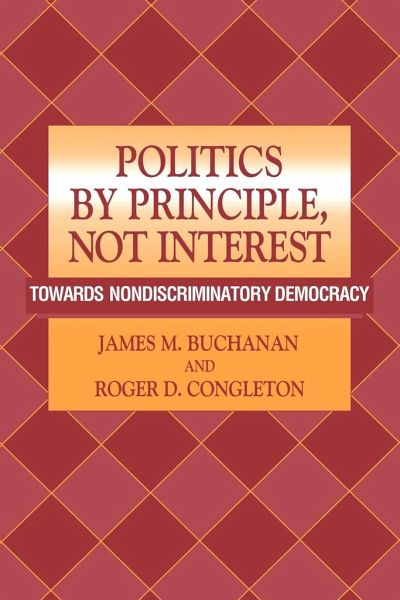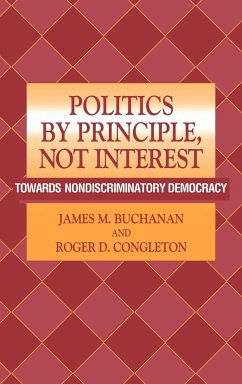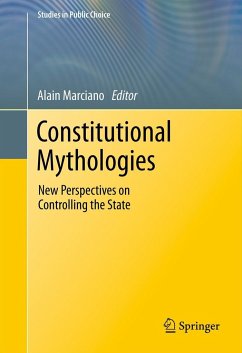
Politics by Principle, Not Interest
Towards Nondiscriminatory Democracy
Versandkostenfrei!
Versandfertig in 1-2 Wochen
42,99 €
inkl. MwSt.
Weitere Ausgaben:

PAYBACK Punkte
21 °P sammeln!
This book focuses on the effects of applying a generality constraint on the political process.The very logic of majority rule implies unequal treatment or discrimination. If left unconstrained, majority coalitions will promote the interests of their own members at the expense of other persons. This book focuses on the effects of applying a generality constraint on the political process. Under this requirement, majorities would be constitutionally prohibited from treating different persons and groups differently. The generality principle is familiar in that all persons are to be treated equally...
This book focuses on the effects of applying a generality constraint on the political process.
The very logic of majority rule implies unequal treatment or discrimination. If left unconstrained, majority coalitions will promote the interests of their own members at the expense of other persons. This book focuses on the effects of applying a generality constraint on the political process. Under this requirement, majorities would be constitutionally prohibited from treating different persons and groups differently. The generality principle is familiar in that all persons are to be treated equally. In summary, this book extends the generality norm to politics. Several defences of equal treatment or generality are developed and applied. These include the familiar intuition that invokes fairness. But the primary argument here is centred on political efficiency, which is increased when governments are constrained to treat persons or groups generally rather than differentially. The political efficiency defence of the generality constraint is based on a public choice analysis of the implication of majoritarian discrimination.
Review quote:
"The idea that legislation should be general and non-discriminatory - that equals should be treated equally - is hardly new. But the notion that this idea might be a constitutional principle, serving to promote political efficiency in the face of the scope for special interest politics that simple majoritarianism provides - THAT notion is a distinctively 'public choice' one, and receives here at the hands of Buchanan and Congleton its most elegant, detailed and compelling exposition."
Geoffrey Brennan, Australian National University
"The disadvantages of the simple majority rule for making collective decisions have been recounted for many years by many public choice scholars. James Buchanan and Roger Congleton attempt to rejustify the use of the simple majority rule in this highly original and thought provoking treatise on political institutions."
Dennis C. Mueller, University of Vienna
"James Buchanan and Roger Congleton provide a thought-provoking analysis of the impact of incorporating a generality constraint to the political arena, so that government actions and policies are applied to everyone equally. This book has the makings of a landmark work that enlightens readers, researchers, students, and practitioners about how the absence of a generality principle promotes rent seeking and other governmental wastes. The authors offer a well-argued, nicely crafted and engaging work of the type one has come to expect from Buchanan and Congleton."
Todd Sandler, Iowa State University
"This volume promises to produce much discussion in academic seminars. Graduate students and faculty."
Choice
"By analyzing majoritarian politics, the book addresses a problem of major importance for all interested in understanding political processes in democratic societies and/or living in nondiscriminatory societies. Thought provoking and carefully argued, it deserves serious reading and discussion."
Constitutional Political Economy
"This book has more depth, breadth, and importance than some shelves full of work I have looked at. Buchanan and Congleton have managed, in a very short space, to make an argument that is both plausible and revolutionary. Politics by principle, not interest is a new benchmark in the application of public choice reasoning to political theory."
Michael C. Munger, Public Choice
Table of contents:
List of figures and tables; Preface; Acknowledgements; Part I. Introduction: 1. Generality, law, and politics; Part II. Analysis: 2. Majoritarian democracy; 3. Eliminating the off-diagonals; 4. Extending the argument; 5. Generality and the political agenda; Part III. Application: 6. Generality and externality; 7. Market restriction and the generality norm; 8. The political efficiency of general taxation; 9. Deficit financing and intertemporal discrimination; 10. Generality and the supply of public services; 11. Generality and redistribution; 12. Generality without uniformity: social insurance; 13. Generality without uniformity: federalism; Part IV. Prospect: 14. The political shape of constitutional order; Endnotes; References; Index.
The very logic of majority rule implies unequal treatment or discrimination. If left unconstrained, majority coalitions will promote the interests of their own members at the expense of other persons. This book focuses on the effects of applying a generality constraint on the political process. Under this requirement, majorities would be constitutionally prohibited from treating different persons and groups differently. The generality principle is familiar in that all persons are to be treated equally. In summary, this book extends the generality norm to politics. Several defences of equal treatment or generality are developed and applied. These include the familiar intuition that invokes fairness. But the primary argument here is centred on political efficiency, which is increased when governments are constrained to treat persons or groups generally rather than differentially. The political efficiency defence of the generality constraint is based on a public choice analysis of the implication of majoritarian discrimination.
Review quote:
"The idea that legislation should be general and non-discriminatory - that equals should be treated equally - is hardly new. But the notion that this idea might be a constitutional principle, serving to promote political efficiency in the face of the scope for special interest politics that simple majoritarianism provides - THAT notion is a distinctively 'public choice' one, and receives here at the hands of Buchanan and Congleton its most elegant, detailed and compelling exposition."
Geoffrey Brennan, Australian National University
"The disadvantages of the simple majority rule for making collective decisions have been recounted for many years by many public choice scholars. James Buchanan and Roger Congleton attempt to rejustify the use of the simple majority rule in this highly original and thought provoking treatise on political institutions."
Dennis C. Mueller, University of Vienna
"James Buchanan and Roger Congleton provide a thought-provoking analysis of the impact of incorporating a generality constraint to the political arena, so that government actions and policies are applied to everyone equally. This book has the makings of a landmark work that enlightens readers, researchers, students, and practitioners about how the absence of a generality principle promotes rent seeking and other governmental wastes. The authors offer a well-argued, nicely crafted and engaging work of the type one has come to expect from Buchanan and Congleton."
Todd Sandler, Iowa State University
"This volume promises to produce much discussion in academic seminars. Graduate students and faculty."
Choice
"By analyzing majoritarian politics, the book addresses a problem of major importance for all interested in understanding political processes in democratic societies and/or living in nondiscriminatory societies. Thought provoking and carefully argued, it deserves serious reading and discussion."
Constitutional Political Economy
"This book has more depth, breadth, and importance than some shelves full of work I have looked at. Buchanan and Congleton have managed, in a very short space, to make an argument that is both plausible and revolutionary. Politics by principle, not interest is a new benchmark in the application of public choice reasoning to political theory."
Michael C. Munger, Public Choice
Table of contents:
List of figures and tables; Preface; Acknowledgements; Part I. Introduction: 1. Generality, law, and politics; Part II. Analysis: 2. Majoritarian democracy; 3. Eliminating the off-diagonals; 4. Extending the argument; 5. Generality and the political agenda; Part III. Application: 6. Generality and externality; 7. Market restriction and the generality norm; 8. The political efficiency of general taxation; 9. Deficit financing and intertemporal discrimination; 10. Generality and the supply of public services; 11. Generality and redistribution; 12. Generality without uniformity: social insurance; 13. Generality without uniformity: federalism; Part IV. Prospect: 14. The political shape of constitutional order; Endnotes; References; Index.














